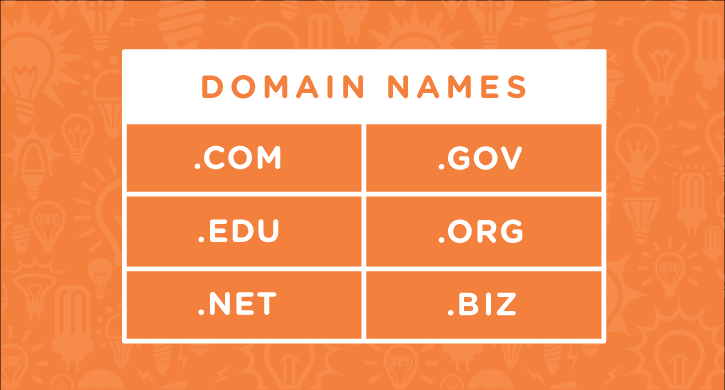

At the time of this writing, any domains mentioned as examples were found unregistered or available for sale.
Choosing a domain name for your ecommerce website is one of the most important decisions you'll make for your business. Your name is the first piece of your brand users will experience, and serves as a symbolic placeholder for your business in the minds of users. You'll also need to make sure that the domain name that you choose is available for purchase, and that it's identical to (or closely matches) the name of your brand or business. When choosing a name for your ecommerce company, begin by answering the following questions:
- What concepts and feelings do you want your store's name to invoke?
- How can you choose a domain name that customers can easily remember?
- Do you want your domain name to include a particular keyword or phrase?
- What is your budget? An unregistered domain won't cost much, but an established domain might be expensive.
When coming up with ideas for names for your ecommerce site, you can sit around and wait for inspiration to strike, and then hope your domain is availale - or you can get proactive and do some real, effective domain name research.
Today’s guide on how to choose a domain name will walk you through those steps, using a home care & medical supply store as an example. We'll cast a wide net to compile the largest list of potential domain names we can. Then, we'll set out guidelines to help you strike the non-starters from your list until you have a handful of appropriate, available domains to choose from.
Use our guide to create a vetted list of domain names perfect for your ecommerce website. Availability will be the primary major challenge in creating a name that sets you apart, so we'll show you how to find the best domain names available to register. We'll also walk you through some real-world examples of how to brainstorm intensively about the nature of your business and customers to create something exceptional.
Prioritizing Branding or Discoverability
The first decision you need to make when choosing your domain name is whether you'll prioritize uniqueness and branding or targeting a particular keyword or phrase. To determine the answer to that question, you'll first need to decide how you plan to get trafic to your site. If organic search engine traffic will be your priority, you’ll probably want to utilize some keywords in your domain. If you're relying more on social media, pay-per-click advertising, or affiliate marketing, targeting a keyword in your domain is less important.In most cases, a mix of both is best, striving to create a unique brand name while also using discovery-related terms. Giving your website a name that makes it clear what you sell and also invokes concepts and feelings that resonate with your customer will make your website attractive and memorable. Follow these steps to find the best name for your ecommerce website:
Step-By-Step Guide to Choosing an Ecommerce Domain Name
The SEO focused approach
If you're after organic traffic, having your targeted keyword in your domain name can be a huge advantage. Having an 'exact match domain name' - a domain name that perfectly matches the keyword you're targeting - is a huge indicator to search engines that your website is highly relevant. While an exact-match domain name won't be the only thing you need to rank, it will definitely help. However, there are some downsides to keyword-targeted domains:- Exact-match domain names are usually already taken by someone else.
- Buying an exact-match domain name can be expensive.
- Having a very targeted domain name can restrict what products you sell - if your website is named www.woodenrockingchairs.com you won't want to sell digital cameras.
- Exact-match domain names can be a little bland and impersonal.
If the exact-match domain name you want is already taken, there are some other strategies you can take to get a relevant, keyword-targeted name for your ecommerce store. One reliable means of doing so is to append "store" or one of its synonyms to your market-wide keywords as a suffix. You can even select a variant that captures your brand best, such as choosing "boutique" for a touch of class or "emporium" to imply a market with large selection and low prices. If your root keywords are on the long side, you’ll likely want to choose one of the shorter synonyms.
Suggestions for ecommerce domain name suffixes:
- Store
- Shop
- Outlet
- Mart
- Boutique
- Emporium
- Bazaar
- Market
- Showroom
- Co-Op
- Mall
- Galleria
- Exchange
Keyword multipliers like SEOBook's Keyword List Generator can combine lists of root keywords with suffix or prefix words like our store synonyms to make this process painless and ensure all combinations are captured. Just add your root keywords separated by commas to one of the input fields, with your appended words in the next field. Then click "Generate" to create a huge list of suggested names for your ecommerce website.
The branded name approach
When choosing a branded domain name, you'll want to make sure that the name you choose still implies or indicates what you sell or offer. Tools like Wordoid and Domain Hole's Domain Name Generator generate lists of pronounceable domains that aren't real words. Scanning their results for words with a feeling and sound appropriate to your market will provide a great place to start.Here are some suggestions for branded domain names we found that might be appropriate:
- financis.com
- regenergy.com
- chefficial.com
- stickery.com
- fashional.com
While these names are distinctive and fun, they also give customers a general sense of what is being sold on these sites. Run your website name ideas by some friends and ask them to guess what the website would sell - if their answers vary widely or are way off the mark, it's a good sign that your branded name doesn't do a good job of representing your business.
Blending the SEO and branding approaches
First, create a list of root keywords that define your niche or product offerings. It might also help to order them by preference. For our example, we've compiled the following:- HomeMedical
- HomeMed
- MedicalSupplies
- MedicalSupply
- MedSupplies
- MedSupply
- HomeCare
- HomeHealth
- HomeRehab
Now we'll use several techniques and tools to generate appropriate words and phrases with which to append or prepend our root keywords. By using lots of variations of the root keywords, including abbreviations and plural/non-plural variants, we'll insure that we get the right sound, feeling, and length with the various words we'll mix in.
The following step is the most important for the branding element of this technique, and should be as comprehensive as possible:
Create a list of at least 10 words that describe the brand personality you want to embody, the benefits of products you sell, or concepts with which you generally want to be associated. We'll use "energy", "vitality", "freedom", "well-being", "renewal", "peace", "care", "compassion", "independence", "comfort", and "familiarity".
Next, run each of these through a thesaurus like Visuwords or Thesaurus.com. Type in any other appropriate words that occur to you while using the thesaurus. Make note of any and all words you like. Don't forget to click on the most relevant synonyms to see even more results. Once you have at least 25 (more is better!), start adding them to your root keywords.
Here are a handful of results based on the above root and word list:
- VerveHomeMedical.com
- FlexHomeMedical.com
- ThriveHomeMedical.com
- DashMedicalSupplies.com
- MoxieHomeMedical.com
- HomeHealthSeer.com
- FortMedicalSupply.com
In cases where our synonyms that are a bit on the long side, we can use abbreviations to help keep them short and memorable:
- FortitudeHomeMed.com
- SteadfastMedSupply.com
In addition to the above technique, you can use the domain name generator Impossibility, which will append or prepend a set list of 4-6 letter words to your root phrase. It even displays only results for variants with available domains. While the results won't be as on-point as those from above, they may spark great ideas you hadn't considered. The 4-letter words setting can be particularly helpful when you want your domain to include specific, longer keywords. Here are a few we selected from our results:
- BloomHomeMedical.com
- SereneHomeMed.com
- LiftHomeMedical.com
- SoarHomeMedical.com
- HoneyHomeMedical.com
Other Techniques for Creating the Best Ecommerce Domain Name Ideas
Use phrases and sayings
Common sayings and idioms related to your market can spark great ideas for business and domain names. Input your descriptive brand personality terms into tools like The Free Dictionary's Idiom Finder, Think Slogan, and Phrases.co.uk to look up related sayings.Make note of all aphorisms and proverbs you like. Once you've compiled a list from all starting words, see if you can reformulate them into succinct names that evoke one of the phrases. This can be a great way to find inspiration for domain names.
- Care package: HomeCarePackage.com
- Devil may care: AngelMayCare.com
- Couldn't care less: CareForLess.com
- Not a care in the world: WorldOfCare.com
- Take care: TakeCare.com
Blend keywords together into portmanteaus
A form of wordplay, blended words, also known as portmanteaus, utilizes an overlap in the sound of two words. You'll have to review your root words and descriptor/synonym lists manually for overlap opportunities. You can also use Werd Merge to merge your root words randomly with other words.- Autonomedical.com
- Roosthab.com
- HomesteadcareMed.com
Tweak the spelling
Tweaking involves removing a letter or otherwise changing the spelling of a word for effect. Examples include Zoho (Soho), Zune (tune), Wikia, and eBay. This technique has become very popular recently.- Homehealthr.com
- Homehealr.com
- AtHomeMedica.com
- HomeComfrt.com
- HomeMedSpply.com
Use Compound Keywords
Choose two or more words you want to associate with your brand. In this case, we want to imply we let people take control of their health. So we'll combine variations of synonyms for "home" with "health", "protect", "wellness" and "care". Run all your root keywords and brand personality synonyms through Bust a Name. You can also use SEOBook's keyword multiplier tool from above to combine your root synonyms with brand personality synonyms. While this process will get by far the most relevant results, you can also use Domain Hole's Name Spinner tool to compound your root words with random ones.- VitalitySteward.com
- WellAbode.com
- RehabRoost.com
- VimHome.com
- VitalKeep.com
Affixing prefixes or suffixes to your domain names
This involves affixing a suffix or prefix to an existing word. Examples include Napster, Todoist, and Feedly. The suffix "-ster" is particularly common. These can be a great way to add novelty while keeping character count down. Dot-o-mator is a great tool for this. You can add word and prefix/suffix sets of your own, or use pre-made, themed sets.- HomeHealthster.com
- HomeHealthist.com
- HomeMedster.com
- HomeHealthnik.com
Using unique Top Level Domains (TLDs)
The Top-Level Domain, or TLD, is what follows the website name in a URL. The most common TLD is .com, although you're likely familiar with others, like .net, .org, or .biz. Over the past few years, a large number of alternate TLDs have been created, including a wide variety of industry-specific TLDs. Check this list of all valid TLDs for ideas. Since an alternate TLD can replace ".com" with a keyword, you can free up space in the rest of your domain name for other keywords. Input your root keywords in Domainr and Domain Hole's Brainstormer tool to find such opportunities. However, be warned that most customers are so used to typing '.com' after a website name that they may have difficulties remembering your domain name if you're using an alternate TLD.- Home.healthcare
- Homehealth.care
- Homecare.health
- Homecare.med
Domain Name Generator Tools
Here are a few more tools for a final sweep of potential domain names before we narrow our results.Picking the Best Domain Name for Your Ecommerce Site
As you can see, some of these methods produce better results depending on the type of business you're in, which is why it's important to cast a wide net and come up with as many ideas for a name as possible. After you've created your list of ideas, it's time to choose the best name from all of the possibilities. As you do so, keep in mind what sorts of themes various names might lend to your branding.Here are some evaluative criteria to help narrow the field and help you choose the right domain name. For any that don't fit the bill, strike them from your list.
Your domain name should be:
- Easy to remember (3 words or fewer is a good target)
- As short as possible (approximately 17 characters or less)
- Easy to type
- Easy to say out loud
- Easy to read (should not appear to contain other words when words are read side by side)
- Unique
- Accurate and honest to your business
- Use .com domains only in the US, unless you're going with a new top-level domain like .health
- Not be in use by other organizations
- Not contain numbers or hyphens
Don't get married to one word or phrase. You may already have favorites by the time you get ready to narrow your results. If you find that it doesn't fit the criteria above, be ready to strike it and move on. Whether it's in use by another organization, not quite accurate to what you sell, or just too long or complex, you'll want to hold out for a more ideal domain.
Once you've got your list down to 5-10 options, you'll want to make sure no variants are taken by other businesses, and that social media accounts are available. NameChk checks more than 150 social media and blogging platforms to ensure a user name is available, while Instant Domain Search checks the availability of domains and variants.
Finally, once you decide on a name, buy it and any important variations (including different TLD variants)right away. It's also a good idea to buy your domain name quickly after searching for it - there are bots that purchase domains that have been recently searched (to sell them for a profit later), as well as bots that buy domains similar to recently purchased ones. Now that you've chosen a name, be sure to review our blog post on steps to setting up your domain to finish the process. After you've picked the perfect domain name, it's time to start building your own ecommerce store. Volusion offers a 14-day free trial of our all-in-one ecommerce software. From easily building a custom store to listing your products with a click, Volusion is the easiest way to sell online. See for yourself why Volusion merchants sell an average of 2.8x more than merchants using other ecommerce platforms.
Have questions or comments about choosing a domain name for your ecommerce website? Use the comments section below!











